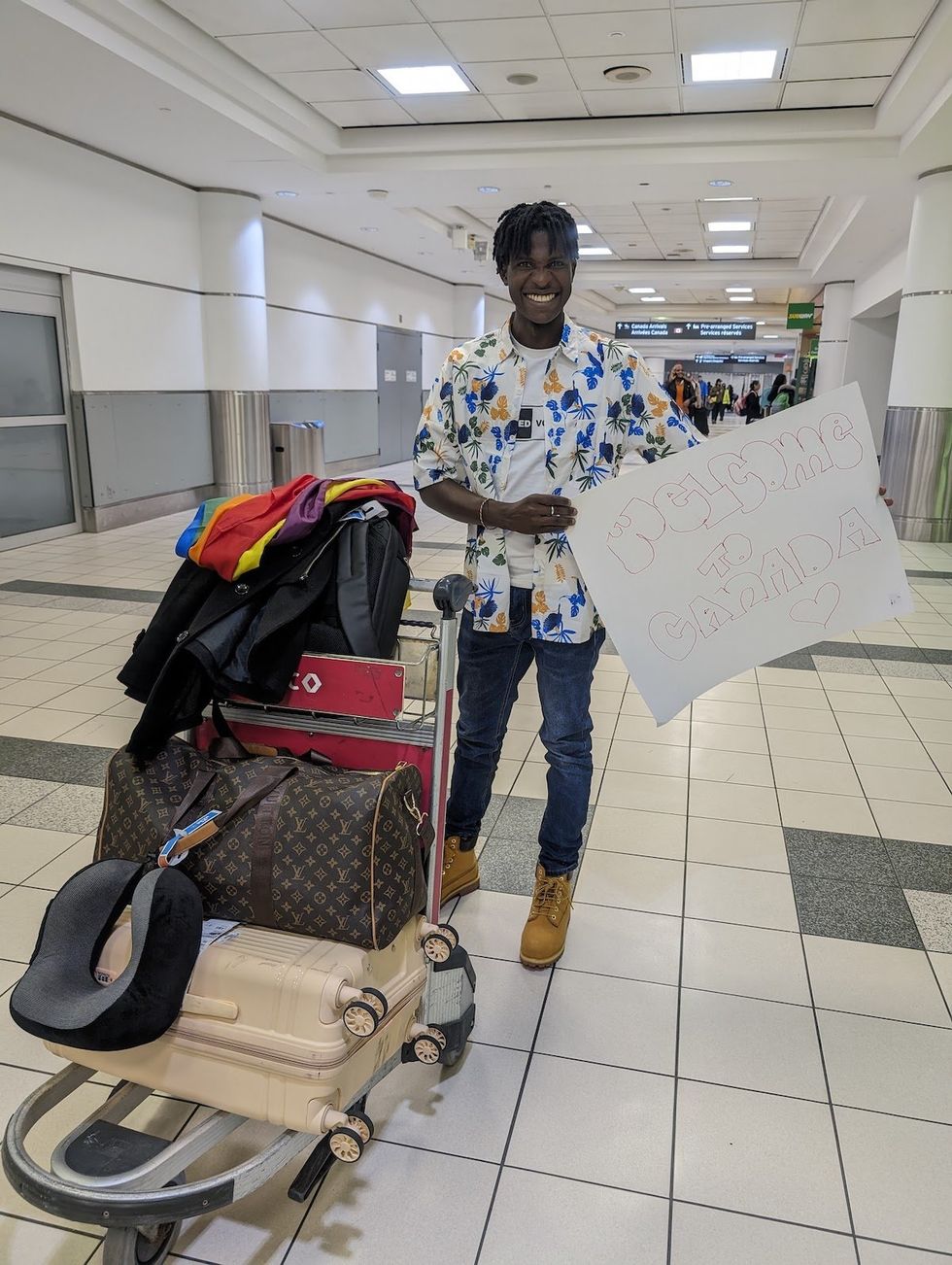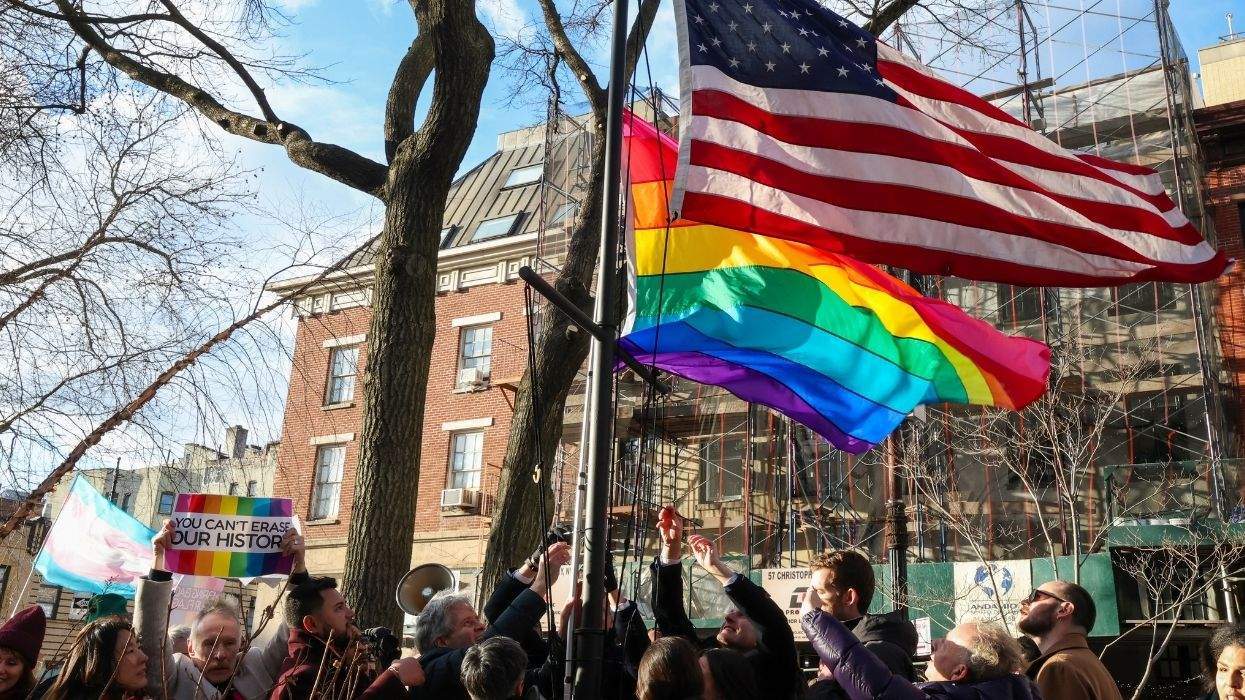The scar on Steven Kabuye’s right arm runs over a foot long. At the base of his torso, a small puncture wound marks where a knife almost ended his life.
“Marks that will never leave my body,” reads the caption of one of Kabuye’s recent Instagram posts, which shows his injuries. “These scars should remind everyone how the Anti-Homosexuality Act 2023 has legalized homophobia in Uganda.”
The post is one of many the 26-year-old activist has made since he fled Kampala, Uganda in January after two men attacked him on his way to work. Video of Kabuye bleeding on the ground went viral on X, the platform formerly known as Twitter, and quickly became an online spotlight highlighting widespread violence against the LGBTQ+ community in the East African country.
More than 600 LGBTQ+ Ugandans have faced human rights violations and abuses based on their sexual orientation or gender identity since lawmakers approved the country’s harsh anti-LGBTQ+ law last year, according to United Nations estimates. Advocates are fighting the law in court, but a growing number of people have fled the country due to violence or death threats.
Kabuye is now reestablishing himself in Toronto, Canada with the help of Rainbow Railroad, a nonprofit organization that funds the transportation and reestablishment of LGBTQ people at immediate risk of violence due to their sexual orientation. From his new home, he continues to run his grassroots social justice organization, Coloured Voices Media Foundation – Truth to LGBTQ Uganda.
He recently spoke with The Advocate about his escape from his hometown.
“I'm continuing as much as possible to share my voice,” he said. “Ugandans need it now more than ever.”
Kabuye came out at the age of 18 when he was still in high school in Kampala. He faced questions from classmates and some bullying, but never anything worse, he said.
“Most of my classmates embraced it and didn’t judge,” Kabuye said. “They just asked me to stay safe.”
In 2021, one of his friends got kicked out of his parent’s homes for being gay. While homeless, they had trouble accessing aid from local organizations dedicated to assisting LGBTQ+ youth. Kabuye did not say which organization.
“They were told to ‘bring evidence that proved they were gay,’ by people running the organization,” he said. “I was like, ‘What evidence does one have to have?’”
Shortly after, Kabuye founded his organization, Coloured Voices Media Foundation, with a few friends. The group’s mission was to debunk rampant misinformation about the Ugandan LGBTQ community through educational content creation. The organization became a pillar of the local community in Kampala when lawmakers introduced the Anti-Homosexuality Act of 2023.
The law added a 20-year prison sentence punishment for anyone convicted of “promoting homosexuality” and legalized the death penalty for so-called “aggravated homosexuality,” where same-sex acts involved children or people with disabilities, or where drugs or alcohol may impair judgment.
The new law drew widespread condemnation from abroad. The World Bank paused public financing for the Ugandan government. The U.S. also issued its own sanctions against the country, including a pause on funding for HIV/AIDS treatment and prevention.
But Uganda’s conservative leadership and religious population have embraced the law. Politicians and local media organizations regularly encourage citizens to report suspected gay Ugandans to local authorities, Kabuye said.
“It legalizes homophobia,” he said. “And it basically gives people a mandate to kill gay people if they get a chance.”
A few days after its passage in May, a man threw a rock at one of Kabuye’s coworkers as they were leaving the office. He also started receiving death threats online, especially through X.
“People were even posting directions to my house,” he said.
After receiving a number of threats, Kabuye fled to Nairobi, Kenya last fall. He took a bus and found a cheap hotel to hide inside for a month, posting about his situation online.
“I had enough money to last 10 days, but I got a lot of help from the internet,” he said.
From Nairobi, he started posting more often on social media in protest of Uganda’s harsh new law. But he missed working on the ground in Kampala, so he returned in December.
After returning home, he quickly got more involved in local activism. He attended a hearing of constitutional petitions against the Anti-Homosexuality Act, and launched new sex education classes and workshops on how to safely travel around in public.
“We all changed our looks, we wore sunglasses and hoods even when it was hot to protect ourselves from violence,” he said.
He also organized fun social events to help improve mental health within the community.
“We went to a beach, anything to get trauma off of our minds,” he said.
The work felt fulfilling. But near the end of December, he started suspecting that he was being followed when he traveled to and from work. Men would pursue him.
On a Wednesday morning in January, he set off on his commute. A few minutes into his walk, a motorbike with two men pulled up next to him on the road.
One of the men held a knife and ran towards him, Kabuye said. As he approached, he lifted the knife at the level of the 26-year-old’s neck.
“I tried to shield myself with my arm, but then they stabbed my stomach,” he said.
The next thing he remembers is falling to the ground and screaming out for help. He remained conscious and tried calling friends on his mobile phone, but nobody picked up. So, he started tweeting for help. He posted a video of him screaming and crying on the ground. (The video has since been taken down by X.)
The last thing he remembers is getting a call from a friend who asked where he was.
“Follow my route to work,” Kabuye told his friend.
Then he blacked out.
Police haven’t arrested the two men Kabuye said attacked him. Instead, an officer visited him in the hospital and told Kabuye he was being investigated for promoting homosexuality, Kabuye said.
“They searched my house while I was in the hospital,” he said. “And they told our neighbors that me and my roommates were gay and we were recruiting children.”
Kampala’s police department did not respond to a request for comment.
After two days in the hospital, Kabuye called Frank Mugisha, another prominent Ugandan activist, and told him he didn’t feel safe in the country anymore. With the help of Mugisha and a few other activists, Kabuye retrieved his passport and a bag of clothes from home and flew to Nairobi.
He boarded the plane while still wearing bandages. He felt sick on the hour-long flight and went to another hospital in Nairobi. That’s when he got in contact with representatives from Rainbow Railroad over email, who arranged an emergency flight from Nairobi to Canada.
He had to fly back through Entebbe International Airport in Uganda first, though. In customs, officers scanned his passport multiple times, which scared him.
“I thought they were going to arrest me right there,” he said. But they ultimately let him through.
On March 6, he landed in Toronto. Representatives from Rainbow Railroad greeted him with a pride flag in the terminal.
“People were looking at me and smiling and I was like, ‘Is this what freedom tastes like?’” he said.

Steven Kabuye, 26, arrives at Toronto Pearson International Airport on March 6, 2024.
Courtesy Rainbow Railroad
Rainbow Railroad continues to receive more requests for assistance from Uganda than almost any other country. The organization has seen a 49 percent increase in requests for assistance in the first two months of 2024 compared to the same period last year, according to Timothy Chan, the organization’s director of communications.
“Kabuye’s story underscores the deadly reality LGBTQI+ Ugandans face since President Museveni signed the Anti-Homosexuality Act (AHA23) into law nearly one year ago,” Chan said. “We continue to receive disturbing reports of persecution that include torture, suicide, loss of employment, violent arrests, and evictions of LGBTQI+ people.”
Since he arrived in Toronto, Kabuye has been living in an Airbnb. He’s now looking for more permanent housing while his legal counsel helps him apply for asylum status. He hopes to continue his activism from abroad.
On April 3, Uganda’s constitutional constitutional court upheld the majority of the country’s law. Ugandan activists from around the world took to social media to denounce the decision.
Kabuye did too.
“The LGBTQI+ community has been pushed further in the darkness, as always, with claims of protecting public policy and moral values,” Kabuye tweeted, along with a photo of him watching the court’s livestream on his phone. “The price of freedom to an ordinary LGBTQI+ Ugandan is death.”
















Charlie Kirk DID say stoning gay people was the 'perfect law' — and these other heinous quotes
These are some of his worst comments about LGBTQ+ people made by Charlie Kirk.